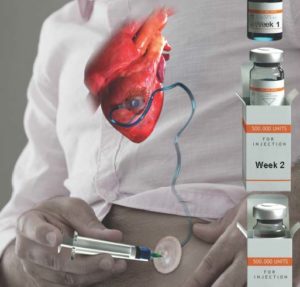Coming up in the Irish Heart Foundation
Coming up in the Irish Heart Foundation July to August
Read MoreImagine being able to deliver medicine directly to the heart itself to heal it after a heart attack?
A new device developed by researchers from NUI Galway, the Royal College of Surgeons in Ireland, Trinity College Dublin, AMBER, the Science Foundation Ireland funded materials science centre in Ireland, along with scientists in the US could very well make this a reality in the near future.
When a patient has a heart attack their heart can becoming scarred and this can lead to heart failure. Multiple therapies are currently being explored to prevent this from happening including the use of drugs, proteins and adult stem cells. The problems with delivering these treatments currently are that they don’t stay at their intended site on the beating heart, can cause toxic side effects and often require multiple doses to be effective.
In an effort to solve this, a group of investigators including eight Irish researchers, have recently designed a device called Therepi that can be placed directly onto the beating heart.
The Therepi device contains a storage space or pouch for drugs or cells that can be refilled a number of times from a port or access point under the skin. This allows for medicines to be delivered multiple times directly onto the heart via the access point without the need for invasive treatment. The researchers have shown using a model of a heart attack that this device can increase heart function over four weeks when stem cells are repeatedly delivered to the heart.

Vision for clinical translation of Therepi. The vision for clinical use of Therepi, where a patient or medical professional can refill therapy directly to the heart from a port under the skin. Photo: Peter Allen, Harvard John A. Paulson School of Engineering and Applied Sciences
Professor Ellen Roche, co-first author of the study, Assistant Professor at the Massachusetts Institute of Technology (MIT), and former researcher at NUI Galway said, “Our study demonstrates that Therepi can repeatedly deliver drugs and increase retention of cells at the heart to increase function. For us, this is only the beginning of multiple ongoing studies that will use this system as a platform device for therapy delivery to the diseased heart, and as a research tool to further scientific understanding of the effects of a localised, refillable treatment regimen at various diseased organs. It was a privilege to work with a talented multi-disciplinary, inter-institutional team to make this study possible.”
Professor Garry Duffy, AMBER Investigator and Personal Professor in Anatomy at NUI Galway and a senior co-author of the study, added: “I have no doubt that the development of Therepi will impact care for patients with heart disease in the future and its main advantage allows for treatment to be tailored to individual patient need. Therepi is a medical device that allows keyhole surgical placement of a depot or pouch to the outside surface of the heart, and this pouch can be topped-up with drugs or stem cells using a port that sits just below the skin. Our study shows that this local delivery with top-ups improves heart function after a heart attack in a pre-clinical model.”
Collaborative international study develops novel minimally-invasive ‘Therepi’ device that can increase heart function after a heart attack. Here is a short video of the approach.
"An exciting development which, if proven in clinical studies, could provide an important therapy for patients with heart muscle disease.”
Dr Angie Brown, Medical Director of the Irish Heart Foundation, said that the research paper demonstrated “an exciting development which, if proven in clinical studies, could provide an important therapy for patients with heart muscle disease.”
The study was published in the internationally respected journal, Nature Biomedical Engineering.
The published study was the result of a collaboration between Harvard, MIT and Boston Children’s Hospital in the USA, and NUI Galway, RCSI, TCD and AMBER, the Science Foundation Ireland funded materials science centre in Ireland.
Coming up in the Irish Heart Foundation July to August
Read MoreGet checked with your GP or local pharmacy
Read MoreOver 125,000 raised by Arctic Challenge participants
Read MoreComing up in the Irish Heart Foundation April - June
Read More2025-06-20